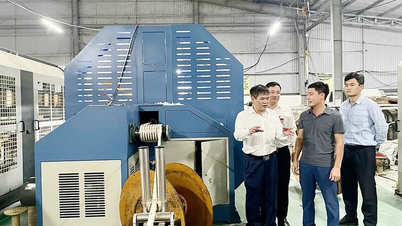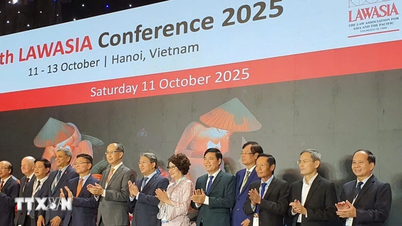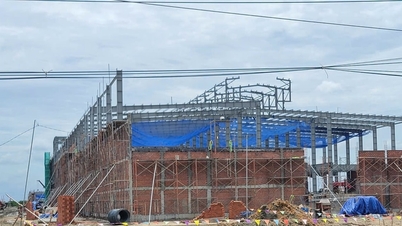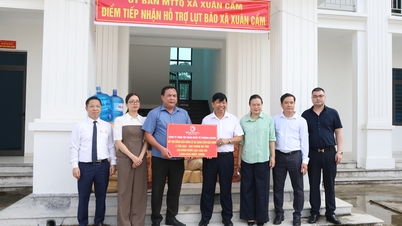According to a survey by the General Statistics Office for the period 2021 - 2023, the average annual revenue of a business household is from 300 - 500 million VND. Notably, there is a group of business households operating in areas such as food and beverage, retail and small manufacturing that are capable of achieving revenue of over 1 billion VND/year. According to the latest data from the Tax Department, the country currently has about 37,000 business households with revenue of over 1 billion VND/year - a group of subjects capable of converting into small enterprises.
At the question and answer session at the 9th Session of the 15th National Assembly, Minister of Finance Nguyen Van Thang stated three main reasons why business households do not want to convert into enterprises. First, the cost of legal compliance between households and enterprises is still large. Second, business households do not fully understand legal regulations and are not familiar with accounting management. Third, households are being subject to lump-sum taxes and simpler accounting, invoice and voucher regimes than enterprises.
Looking at this situation from a specific perspective, some experts believe that the majority of business households do not want to convert into enterprises because enterprises currently pay higher taxes than business households. Another factor is capital, business households only need a small amount of capital while enterprises need large investment capital, costs for personnel, equipment, factories, and production lines will of course be much larger. In addition, there is also a very important reason that the production capacity, finance, solutions, and business orientation of business households are still very limited, and the State's support policies have not really brought about effectiveness.
To overcome this situation, Minister Nguyen Van Thang said that the Ministry of Finance has identified key groups of solutions such as reviewing and perfecting the legal framework on business households, narrowing the gap in management organization and financial regime with enterprises. Perfecting legal regulations, upgrading technical infrastructure to implement the elimination of lump-sum tax from January 1, 2026, thereby making business household activities transparent. Implementing policies to support business households in transformation such as exempting corporate income tax for the first 3 years, abolishing business license fees, providing free digital platforms and shared accounting software. Strengthening propaganda, raising awareness and management capacity so that business households can confidently transform and develop sustainably according to the enterprise model.
The above solutions are necessary, however, according to an expert, to encourage business households to transform into enterprises, the most important thing is to simplify the process and procedures. The corporate governance model should not be applied because it will be inappropriate, the apparatus will be cumbersome and costly. In particular, it is necessary to carry out a revolution in thinking so that business households see and understand their role and responsibility in the overall development of the country as well as the inevitable trend of transformation to expand the scale of production and market. At the same time, consider becoming an enterprise as an affirmation of their value, brand and reputation.
Resolution 68 on private economic development sets the target of having 1 million more enterprises by 2030. To achieve this goal, in addition to macro solutions, policies to support business households to convert into enterprises need to be designed in a synchronous, stable, practical and effective manner so that business households after conversion can develop sustainably and become an inevitable need according to market rules.
Source: https://daibieunhandan.vn/thiet-ke-chinh-sach-dong-bo-on-dinh-hieu-qua-10389948.html



![[Photo] Ho Chi Minh City is brilliant with flags and flowers on the eve of the 1st Party Congress, term 2025-2030](https://vphoto.vietnam.vn/thumb/1200x675/vietnam/resource/IMAGE/2025/10/10/1760102923219_ndo_br_thiet-ke-chua-co-ten-43-png.webp)
![[Photo] Opening of the World Cultural Festival in Hanoi](https://vphoto.vietnam.vn/thumb/1200x675/vietnam/resource/IMAGE/2025/10/10/1760113426728_ndo_br_lehoi-khaimac-jpg.webp)
![[Photo] General Secretary attends the parade to celebrate the 80th anniversary of the founding of the Korean Workers' Party](https://vphoto.vietnam.vn/thumb/1200x675/vietnam/resource/IMAGE/2025/10/11/1760150039564_vna-potal-tong-bi-thu-du-le-duyet-binh-ky-niem-80-nam-thanh-lap-dang-lao-dong-trieu-tien-8331994-jpg.webp)




































































































Comment (0)